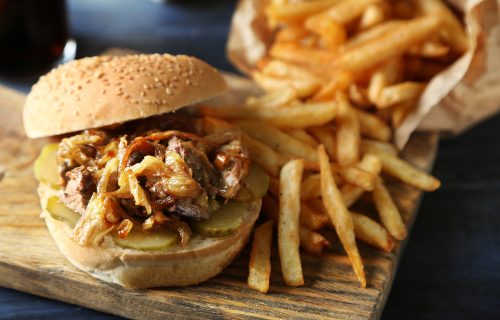
Beginner Weight Loss Mistakes – and How to Avoid Them
Losing weight can be a complicated process. Many people will begin the journey and get quick results initially, only to stop losing and get discouraged.
They may even give up because it seems too overwhelming and start making all kinds of weight loss mistakes in an effort to get faster results.
Maintaining a healthy weight would not be as difficult if there were not so many falsehoods out there about losing weight and ways to ‘cheat the system’.
But let me tell you…there is no way to cheat the system. Here is a list of ten weight loss myths and how to avoid getting caught up in them.
MISTAKE #1: Skipping Meals
There are many solid arguments out there that make the idea of fasting, or skipping meals, sound like the holy grail of weight loss.
While fasting has many health benefits, and can be an excellent way to stabilise your blood sugar, it may not necessarily take the kilos off any faster that if you chose to eat regular meals.
Also, if you have a history of eating disorders, skipping meals can trigger a relapse, so tread very carefully, and always talk to your doctor or healthcare professional before undertaking any form of fasting.
MISTAKE #2: Eating Only Low Fat Foods
So-called ‘low-fat foods’ are not always as they seem. Many companies will sell a low-fat version of a product that contains a high amount of fat but contains less fat than the original product.
The idea is to make people feel like they are getting a healthier option, which is not always the case.
Another problem with low-fat foods is that some companies will add extra sugar or salt to compensate for the lower fat content.
This helps to preserve the taste and shelf life of the product. It may look healthier, but you should always check the label to see what ingredients are listed before you buy.
MISTAKE #3: No Cheating Allowed
Everyone thinks that in order to lose weight, they must cut out all treats and favourite foods.
The truth is ‘cheating’ is a good thing sometimes. If you deny yourself your favourite foods, your body will crave them and make you feel as if you are doing something wrong if you indulge.
This is not sustainable, and in the end you’ll cave in.
The key is not to eat the whole cake. Take a small piece, smaller than usual, and less often. If you make having your treats a part of your eating routine, there is a better chance for success.
You will not feel like you are doing something wrong when you have something you like, making it less likely to give up on the entire regime. A strong mindset is incredibly important in staying on your path, so don’t make it any harder than it has to be.
MISTAKE #4: Using Substitute Sugars and Sweeteners
Sugar is sugar. Your body will treat all sugar equally, and so should your mind. The amount of sugar you take is more important than the sugar source.
You do not have to cut all sugar out of your diet but use it in moderation and try not to buy products that add extra sugar of any kind.
For example, whether you take a teaspoon of honey or a teaspoon of white sugar in your tea makes no difference. Chemical sweeteners such as sucralose are even worse, and can increase your sugar cravings in the long-run.
If sugar is your craving, try using fresh fruit so you will get additional nutritional value.
MISTAKE #5: Buying Expensive Over the Counter Weight Loss Products
It would be best to never use an over-the-counter weight loss product without talking to your doctor first. Just because it worked for your cousin does not mean it will work for you.
Each person’s weight loss journey will be different, and everyone has different needs. Over-the-counter products are advertised as a quick fix for all.
You could have underlining medical problems, mental or physical, that are hindering your weight loss.
Talking with your doctor, eating a healthy diet, and exercising will go much further in learning how to maintain a healthy weight than using a quick fix that can be picked up at your local retailer.
MISTAKE #6: Carb-Phobia
Low-carb diets have been popular for years and have shown to be useful for weight loss.
However, in most cases the success is short-lived, especially when people start cutting carbs entirely from their diets.
Carbohydrates are fuel for our bodies and are used for most of our body’s functions; they are not the enemy!
Obviously, certain carbs will give you greater nutritional benefit. Vegetables, fruits, and (eek) yes, even some grains can be healthy, whereas refined bread, cakes, donuts, etc…should be avoided.
Different people respond in different ways, so always listen to your body. We don’t need to demonize any food group or cut it out altogether, unless there is an obvious allergic reaction.
MISTAKE #7: I Can’t Eat Late at Night
Eating late at night may not be good for your digestion, but when it comes to weight loss, the calories you eat late at night count the same as the calories you eat at any other time of the day.
All calories are counted in the same way no matter what time of day they are consumed. Also, calories are turned into energy, so eating at night may not be the best choice if you have sleep issues or low energy during the day.
If you plan a late snack or enjoy a snack before bed, consider doing a little more exercise throughout the day to help your body use calories in a positive way.
Setting up a routine eating pattern could help with energy levels which could lead to more daily activity. So night snacking could be in your routine, but you may want to consider an earlier snack time.
MISTAKE #8: Assuming High Protein Diets are Best
High protein diets are a popular fad that seems to work well for people, but because of the drastic change in the types of foods consumed on high protein diets, people often find that the weight loss they achieve is challenging to maintain when they stop the diet.
Some people can actually see some weight gain while on a high protein diet. If you are exercising regularly, you may build muscle mass, which means the number on the scale does not necessarily mean you are getting fatter.
If you eat a high protein diet and are not exercising, there is a good chance you could gain more unwanted weight because protein can add fat.
To make a high protein diet work, you must keep a well-balanced diet but add more lean protein.
Do not shy away from other food groups, as this could cause nutrient deficiencies. Also, talk with your doctor before starting a high protein diet so your physician can advise you of any other potential health risks that could arise.
MISTAKE #9: Assuming Drinking More Water will Shed More Kilos
Drinking more water is an excellent idea, and it has many health benefits, but drinking lots of water does not burn calories. It does not matter if the water is ice cold or room temperature. Water is not a magic fat burner.
Water can be helpful in your weight loss journey. Drinking water instead of sugaring drinks will lower your calorie intake, and drinking water will keep you hydrated.
In addition, it can help curb your appetite if you drink it before meals, which can help you feel better overall.
So…it is not the magic cure to weight loss. You still have to put in the work of eating right and exercising, but adding more water is never a bad idea.
MISTAKE #10: The Faster The Better
Remember, you did not gain weight overnight, and you will not lose weight overnight. Many top fad diets advertise losing weight as quickly as possible.
Advertisements like this are not factual. Healthy, long-term weight loss takes time and is a process. You have to change your lifestyle and your eating habits.
These changes are not always easy, and it takes time to see the effects of your hard work. Most people can see an average loss of about one to one and a half kilos per week, and even then, some weeks will not be as successful as others.
The best thing you can do is stay away from the scales and keep working hard, and you will notice a difference in time.
Weight loss is not about cutting corners and eating less. It is about making a healthy lifestyle change with a proper, well-balanced diet and regular physical exercise. It begins with choosing to do the hard work and understanding that eventually, it will not feel like work any longer.
Avoid weight-loss mistakes by following these tips. This will help you learn new routines, habits, and other ways to make a healthy you.
Eventually, these new habits will become your norm, and you can maintain a comfortable, healthy weight in the long-term.



